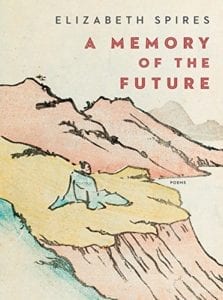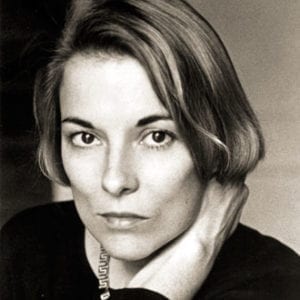Elizabeth Hazen sits down with Elizabeth Spires to discuss her new Poetry Collection, "A Memory of the Future"
 Two well-educated poets, clear admirers of one another's work, and denizens of Baltimore sit for what must have been a rigorous yet pacific cup of tea. Hazen, author of Chaos Theories, gives a short review of Elizabeth Spires' new collection and an overview of her career which, among trenchant analyses, glimmers with admiration. Then follows a short Q&A where Spires muses on her home city, politics at play, and the influence of zen in her life and her poetry.
Two well-educated poets, clear admirers of one another's work, and denizens of Baltimore sit for what must have been a rigorous yet pacific cup of tea. Hazen, author of Chaos Theories, gives a short review of Elizabeth Spires' new collection and an overview of her career which, among trenchant analyses, glimmers with admiration. Then follows a short Q&A where Spires muses on her home city, politics at play, and the influence of zen in her life and her poetry.
Read the full interview here from The Baltimore Fishbowl
A Long Excerpt:
In perhaps the most topical poem in the collection, “The Streaming,” Spires reflects on the destructive and alienating force of technology:
. . . But today, a space of silence
in a church where figures kneel and pray their pain may cease:
Lord, take away the pain. Among flickering candles, they pray.
Shattered. Shattered by a ringing phone. But still you pray.
Leaving, you pass a girl standing in the shadowed nave.
Holding a book bag tightly to her chest. As if it were a shield.
Two words on it, only two words: STAY HUMAN.
Elizabeth Spires’ beautiful poems spark the hope that it may be possible, after all, for us to do exactly that. See her in person at the launch for “A Memory of the Future” at the Ivy Bookshop on Sept. 7. She will appear with poet Michael Collier.
EH: You were born in Ohio, but have lived in Baltimore for decades. What is it about this city that keeps you here? Why do you think so many writers choose to live here?

Elizabeth Spires: I moved to Baltimore in 1978 to get an M.A. in the Writing Seminars at Johns Hopkins. I wanted to stay in this area and for many years I’ve taught at Goucher. We raised our daughter here. But what kept me here for so long? Growing up in a very small town in the Midwest, I always wanted to live on the East Coast where more is happening culturally. Water is important to me. The Chesapeake Bay region–the flat landscape, water melding into sky–has always felt like a kind of psychic home. I also love the fact that Baltimore has an Amtrak station! Trains are my favorite form of transportation.
As to why so many writers live here, I think they realize that Baltimore has a quality of life here that would be unaffordable in places like New York City. It’s a very livable city. And it can be nice, and less distracting for your writing, to live on the periphery, rather than in the center of things.
EH: Since your debut in 1981, you have written six books of poetry. In what ways have your subject and style changed over time? What was unique about the experience of writing “A Memory of the Future”?
ES: I think each of my books reflects, roughly, the decade I am moving through. Beginning with my first book, “Globe,” I was both looking back into childhood as well as feeling preoccupied with (romantic) love. Then came marriage, travel, the birth of my daughter, the death of my mother, and more recently, an interest in Zen, in meditation, in Asian texts and Japanese art. Why Zen? Because this current decade for me is about change and casting off, about stripping things down, about simplifying. I want in my poems right now to boil things down to their essence. In a way, “A Memory of the Future” may be my most “naked” book, but by naked I don’t mean confessional. I mean it is unembellished, unadorned. It’s simply about the “I” making its way through the world.
Order Memory of the Future More from The Baltimore Fishbowl Check out Chaos Theories